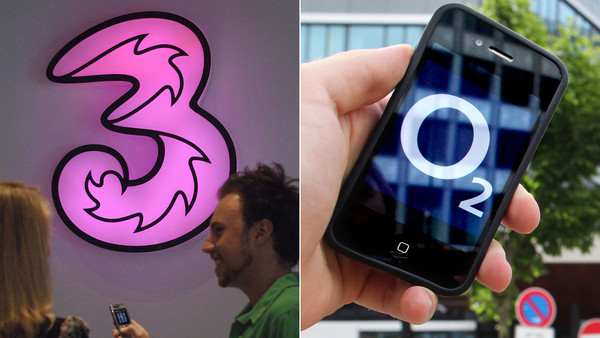British consumers might be forgiven for wondering what problem the proposed £10bn merger of the mobile providers O2 and Three is designed to solve.
如果英国消费者对O2和Three这两家移动通信供应商100亿英镑的合并计划感到疑惑,是情有可原的。
Plans announced last week to weld together the country’s second and fourth largest networks certainly threaten to create an industry leader of impressive scale. With 32m customers, it would be Britain’s largest, putting Vodafone and BT — fresh from announcing the purchase of EE from T-Mobile of Germany and France’s Orange — firmly in the shade.
这两家公司分别是英国第二大和第四大通信网络公司。它们上周宣布的合并计划,当然有可能打造一家规模令人瞩目的行业领导者。如果合并,新公司拥有的3200万客户将使得它成为英国最大的电信公司,将沃达丰(Vodafone)和刚刚宣布要从德国T-Mobile和法国Orange手中收购EE的英国电信(BT)远远甩在身后。

The deal may also allow the pair to achieve substantial savings. Initial estimates suggest they could cut expenses by £400m per annum, equivalent to about 50 per cent of Three’s running costs.
这笔交易还可能让上述两家公司节约大量成本。初步估计显示,合并可以让两家公司每年减少4亿英镑的费用,相当于Three运营成本的约50%。
But it is far from clear how much these accolades will actually benefit their legions of subscribers. While Hutchison Whampoa, the Hong Kong-based owners of Three, is holding out the possibility of better coverage, not least of Britain’s still embryonic 4G services, the real impetus for the transaction appears to lie not in improved customer experience — but in cutting competition and hence bolstering returns.
然而,上述好处有多少将实际落实到广大用户头上,还远不得而知。尽管Three的母公司香港和记黄埔(Hutchison Whampoa)提出,合并可能改善信号覆盖,尤其是就英国仍处于新兴阶段的4G服务而言,但这笔交易的真实目的似乎不在于改善用户体验,而在于减少竞争、从而提高企业回报。
Hutch is following a well-worn script. If the deal is consummated, Britain would be the latest European country to cut the number of mobile providers below the four generally deemed necessary to preserve a market in which competition, rather than regulation, is the mechanism for setting prices.
和记黄埔遵循的是一条经过反复验证的规律。如果交易达成,那么英国将成为欧洲最新一个将移动通信提供商数量减少至四个以下的国家,人们通常认为,一个市场的定价如要由竞争(而不是监管机构)决定,市场上最少需要存在四家提供商。
Germany, Austria and Ireland have all recently allowed deals that reduce the number of networks to just three. In each case, regulatory remedies were imposed to preserve competition compromised by consolidation.
德国、奥地利和爱尔兰最近都批准了致使电信网络运营商数量降至仅三家的交易。这三个国家也同时都出台了监管补救措施,以保护市场竞争不受并购交易损害。
With Germany and Ireland, the deals are too recent to observe their impact on pricing. But in Austria it is possible to see results, and (for customers at least) they are not pretty. In spite of the remedies, mobile pricing has increased sharply. The market leader, Telekom Austria, raised tariffs for smartphone users by nearly 50 per cent last year.
就德国和爱尔兰而言,交易发生时间距今太短,无法观察它们对定价的影响。但在奥地利,已经可以看出并购的后果了,(至少就消费者而言)结果不怎么好看。尽管出台了补救措施,但移动通信定价出现了大幅增长。市场领导者奥地利电信(Telekom Austria)去年将智能手机用户的资费提高了近50%。
Nor was consolidation necessary to stimulate lagging capital expenditure.
合并也不一定能刺激目前疲软的资本支出。
In the years prior to the merger, Austrian operators pumped money into their networks in spite of the market’s four-player structure.
在合并前的那些年,尽管奥地利电信市场上有四家运营商,但各家运营商都对自己的网络投入了大量资金。
European operators argue that consolidation is vital to bring sanity to an industry they say has been brought to its knees by cut-throat competition. They point to the lower margins achieved in Europe relative to the US, where two giant operators dominate the national market.
欧洲运营商抱怨称电信行业已经被你死我活的竞争拖垮了,因此合并对这个行业回归正轨至关重要。他们指出,欧洲运营商的利润率相对于由两家大型运营商主导全国市场的美国更低。
Boosting returns to US levels, Europeans claim, would allow them to provide the sort of new services customers want, such as exclusive media content they can run on their smartphones.
欧洲人称,如能将收益提高到美国的水平,将允许他们提供客户想要的那类新服务,比如向客户提供专属的媒体内容,供他们在智能手机上浏览。
The snag is that European mobile operators do not have unsustainably low profitability. True, returns on capital employed have come down from the very high 20 per cent level of five years ago to just over 10 per cent now. But they remain well above operators’ cost of capital — at least for those that are sensibly capitalised.
问题在于,欧洲移动运营商的盈利没有低到无法为继。诚然,已动用资本回报率已从五年前相当高的20%下降到现在的10%出头,但仍远高于运营商的资本成本——至少对于那些资本结构合理的运营商而言。
Three itself is a good example of how competition can both spur and reward fresh thinking. Created explicitly as an additional operator in 2000 to hold prices down, it has in the past 11 years built a profitable business.
Three本身就是个很好的例子,证明竞争可以激励和奖励新想法。Three在2000年作为全新的运营商而创建,目的就是为了降低价格,而它在过去11年建立起了一个利润颇丰的业务。
It has done so through innovation. Three was among the first of the operators to spot the importance of the smartphone market, and to design products and tariffs to support its expansion. It is, for instance, the only British operator to offer its customers an upgrade to 4G without charge.
Three是通过创新实现这一成绩的。Three是第一批发现智能手机市场重要性的运营商之一,于是开始设计产品和资费以支持这项业务的扩张。比如,Three是唯一一家免费为客户升级到4G服务的英国运营商。
Stripping the UK market of its fourth player will place the onus on the regulator to substitute for this competitive stimulus. Most of the remedies applied in “four to three” markets have focused on forging a privileged position for so-called “virtual” operators that run services perched on one of the main operators’ networks. But by their very nature, these entities can neither lead on price, nor drive systems improvements.
如果除掉英国市场的第四个竞争者,就要由监管机构来弥补竞争刺激的不足。“四变三”市场采用的多数补救办法,是向所谓的“虚拟”运营商赋予特殊地位,这些虚拟运营商在主要运营商之一的网络上运行服务。但就其本性而言,这些虚拟运营商既不能引导价格,又不能推动系统改进。
National regulators have tended to be wary about consolidation. For instance, the German regulator fought hard to thwart the merger of Telefónica/O2 and E-Plus, but was overruled by the European authorities, which took the lead because of the supranational nature of the parent companies involved. Brussels tends to take a more detached view of local competition, focusing on wider questions of competitiveness and investment.
各国监管机构都倾向于对合并采取谨慎态度。例如,德国监管机构一直努力阻止西班牙电信(Telefónica)德国子公司O2收购E-Plus,但遭到欧洲当局否决,欧洲当局此举开了先河,因为所涉母公司具有跨国性质。布鲁塞尔通常倾向于对本地竞争采取一种更超然的态度,而专注于竞争力和投资方面更广泛的问题。
It would be a mistake if Britain went the same way — especially on grounds of European precedent. The mobile business remains a national market. Policy designed to protect consumers and ensure domestic competition should not be abandoned lightly.
如果英国以上述欧洲做法为先例,走他们的老路,将是一个错误。移动业务仍是国内市场,旨在保护消费者和确保国内竞争的政策不应轻易被放弃。
The merger of Three and O2 should be referred back to the UK and given the serious scrutiny it deserves.
Three和O2的合并应交回给英国,并受到应有的严格审查。













